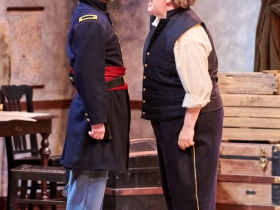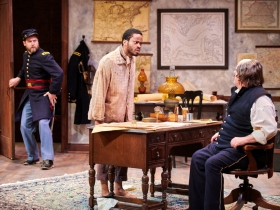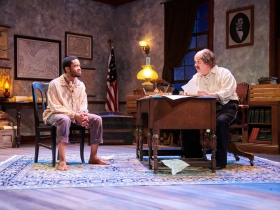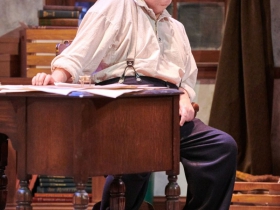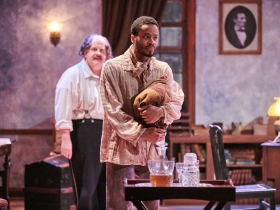Chamber Theatre’s Comic War on Slavery
‘Ben Butler’ is set in Civil War with lessons for today, but the message and buffoonery are over-played.
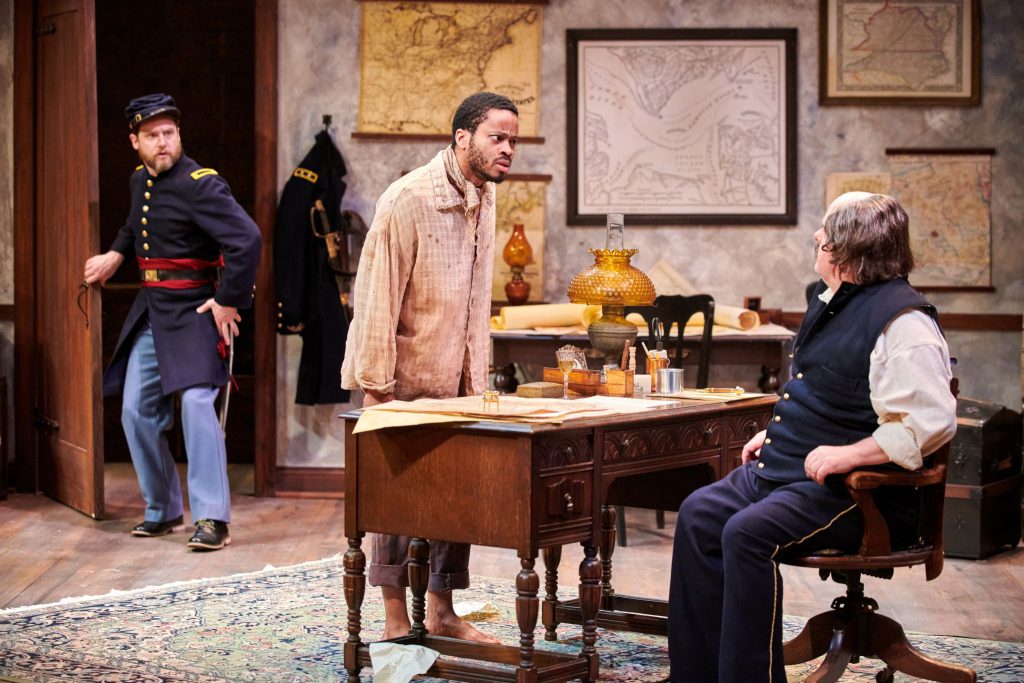
(L-R) Chase Stoeger as Lt. Kelly, Marques Causey as Shepard Mallory, Drew Brhel as Maj. Gen. Ben Butler. Photo by Paul Ruffolo.
Playing up the funny side of legalese, playwright Richard Strand distills a contemporary message about race and society out of a little known incident in Virginia in the earliest days of the Civil War– before either side realized what a conflagration would erupt.
Neither the newly militarized Union nor the Confederacy had yet grasped the consequences of slavery on unsettled law. It was years before blacks moved from being property to being citizens.
Some attention to their dilemma was being paid by such thinkers as black activist Frederick Douglas. He posed the double whammy of black existence explored within Strand’s play – how blacks had to act subservient to survive and yet audacious enough to escape their lot.
Strand imagines such a real Frederick Douglas-like person in Shepard Mallory, a stubborn and overly astute runaway slave. His existence as well as his attitude troubles Union major general named Ben Butler, once a Boston lawyer, now newly in charge of Fort Monroe.
Strand stirs up some slippery verbal duels, the biggest chuckles coming from word plays and how one character’s words bounce back from another’s lips. There is a contemporary edge of meaning and such temptations to over emphasize that the pretense of a drama pivots quickly into broad comedy. Strand’s wit and purpose have attracted other regional presentations, but the trick is how to exist in the shaky ground between historical drama and farce.
Here it proves uncomfortable terrain for these actors, tempted by both naturalistic sincerity and broad comedic instincts. Director Michael Cotey may have hoped the cast would find an even plain to land on within the script’s conflicting intentions. But he may have not realized how the actors would turn to shticks that had worked for them in the past. Scene after scene depends on actors moving purposefully from meaningful looks to comic double takes.
As Butler, Drew Brhel stumbles too quickly into commenting on his character’s personality, turning an admittedly mercurial and unlikely commanding officer into a Bert Lahr burlesque of intentions. The size of the buffoonery makes it hard to believe Butler ever was a shrewd litigator able to dance around conundrums.
Marques Causey as Mallory again demonstrates his ability to hold stage with stillness and quiet conviction, but his character’s verbal mischief quickly turns to modernistic and joke-minded antics (slipping from “Yes Massa” drawl to natural English the way today’s comedians do rather than the way slaves of the time mocked their masters).
Strand has written the role of Butler’s aide as a stooge for his general’s anger and also a willing participant in the general’s plotting. Chase Stoeger never provides more than a semblance of believability beyond a ramrod posture. He seemed more comfortable the broader the part got. With strutting and prissiness, David Sapiro makes memorably distasteful his crucial scene as the Confederate major assigned to bring the slave back to his master.
The tension of those times and the tension of ours justify interest in what Strand is attempting and we are generally engaged – and then frustrated that the style of the play never knits. Perhaps it was fear that a chatty play wouldn’t work without some obvious goosing. The actors push too hard for the laughs and give us little chance to enjoy the verbiage on its own.
Ben Butler Gallery
Dominique Paul Noth served for decades as film and drama critic, later senior editor for features at the Milwaukee Journal. You’ll find his blog here and here.
Review
-
Ouzo Café Is Classic Greek Fare
 May 23rd, 2024 by Cari Taylor-Carlson
May 23rd, 2024 by Cari Taylor-Carlson
-
‘The Treasurer’ a Darkly Funny Family Play
 Apr 29th, 2024 by Dominique Paul Noth
Apr 29th, 2024 by Dominique Paul Noth
-
Anmol Is All About the Spices
 Apr 28th, 2024 by Cari Taylor-Carlson
Apr 28th, 2024 by Cari Taylor-Carlson
Theater
-
‘The Treasurer’ a Darkly Funny Family Play
 Apr 29th, 2024 by Dominique Paul Noth
Apr 29th, 2024 by Dominique Paul Noth
-
Rep’s Nina Simone Play a Puzzle
 Apr 23rd, 2024 by Dominique Paul Noth
Apr 23rd, 2024 by Dominique Paul Noth
-
Skylight’s ‘Eternity’ Is a Slam Bang Show
 Apr 15th, 2024 by Dominique Paul Noth
Apr 15th, 2024 by Dominique Paul Noth

